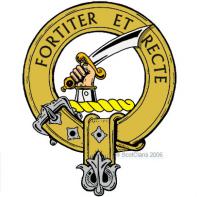
Clan Elliot
Of Breton origin like the Stewarts, the Elliots ( in all phonetic spellings, Eliot, Eliott and Elliott) were among the thousand or so Bretons who constituted the left flank of William the Conqueror’s invading army in 1066. Led by Brien, son of Eudo, the Count of Penthièvre, Judicaël de Lohéac, viscount of the Halegouët ( a densely forested area of Finistère), and Willian fitzOsbern, they participated in the suppression of a revolt at Exeter in 1069, and the repulsion at Barnstaple of an invasion led by the dead King Harold’s sons. Brien was awarded the Earldom of Cornwall, while Judicaël ( or Juhel) was given the lordship of Totnes and vast territory in Devon, where the Eliots first settled. More Eliots ( spelt as Ellyot in 16th century St Germans) settled in South Wales, following its conquest by fitzOsbern, and in the old marcher counties of Monmouth, Hereford and Gloucester. Other companions of the Elliots imported variant names from Brittany, which became familiar in England and Scotland: Eligott, Ellacott, (Breton Elegoët) Ellet, Dalliot ( fr. d’Alliot), Elwett ( Breton Eleouët) and more. It is the name Elliot which predominates now, in England, Wales and Scotland, as well as in the département du Morbihan in Brittany. The Breton origins of the variant Elliot names are found in Finistère, Côtes d’Amor and Loire Atlantique. The Elliots were clearly numerous, as members of a mercenary confederacy or clan, in which military prowess was passed from generation to generation, whose cadets offered professional military services to kings and magnates. The name is unique, being based on the old toponym of Halgoët, the name of an old Breton tribe, based on the Breton word for willow or saughtree. Just as the name Elliot is noted for its many variants, so is the toponym Halegouët or Halgoët. While this uniqueness means that nobody other than Elliots could have given their name to Elliot Water in Angus, further corroborative evidence arises from their inclusion in the ranks of the many continental feudatories settled by William I (the Lion) in the late 12th century, Norman, Flemish, Breton and Picard, all rewarded with lands rather than money. William was also a keen jouster, and Bretons fought for him in tournaments. So overwhelming was this imposition of feudal military tenure, north of the Forth, that the origins of the Elliots were never going to be found other than within these continental families. These included much favoured Flemings, like the founders of Clan Murray, Clan Innes and the Douglas family.
Breton settlers were especially late in adopting new hereditary surnames, and many of modest status seeking assimilation adopted native names. The Elliots were given or adopted the common native name of Elwald, but there is concrete proof of the interchangeability of the names Ellot (later amended to Elliot) in contemporary sources, and pride in the old Breton name by this powerful new Border clan, led by their Redheugh chieftains, following transplantation from Angus by Robert the Bruce, circa 1320, led to eventual abandonment of Elwald. The origins of the horsemanship and military traditions of the medieval Elliots ( all spellings) can only be related to the long struggle of the Bretons against Viking invaders and settlers, ending finally in their expulsion by Count Alan Barbetorte in 939AD, with the aid of the West Saxons and King Athelstan, who had sheltered Alan. The history of the Elliots, Breton, English, Welsh ( even Irish, when the 12th century McElligotts are included) and Scots, but above all of that branch of the Elliots which took lands in Angus, is one of truly epic proportions.
DNA analyses now reveal that others sharing common Elliot ancestry who needed to start using surnames, settled other than in upper Liddesdale, took such new names as Glendinning and Little. Until the advent of surnames many settlers of Breton origin were merely shown as Brito (“the Breton”) in old records.









